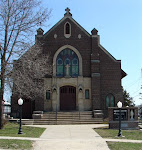King George III
FATHER GEORGE RUTLER
From a Catholic perspective, the unthinking disparagement of King George III, as some sort of tyrant should itself be disparaged.
 |
King George III
1738-1820
|
Stephen Decatur's toast, "Right or wrong, our country!" was qualified by the German Catholic immigrant Carl Schurz: "Our country, right or wrong – when right to be kept right; when wrong to be put right." In this month of patriotic celebrations, we give thanks for the great blessings enjoyed by our nation at the cost of much sacrifice. "The love and service of one's country follow from the duty of gratitude and belong to the order of charity." (Catechism 2239) In the order of charity, and of justice, it is well to avoid rhetorical excess about our nation's history, and to deal carefully with clichés. For example, from a Catholic perspective, the unthinking disparagement of King George III, as some sort of tyrant should itself be disparaged.
The first English monarch since Queen Anne to speak English enjoyed a civility which fostered a golden age of science, letters and art that included Catholics like Alexander Pope. King George was what we would call "pro-life." He fathered fifteen children whom he adored, and he was faithful to his wife, Queen Sophia Charlotte of Mecklenburg-Strelitz, eschewing mistresses, in glaring contrast to the practice of most contemporary sovereigns, whose illicit assignations were tolerated by ecclesiastical officials. The King, sometimes referred to as "Farmer George," was also a "green" lover of a simple ecological life, caring for livestock, especially pigs.
The tax burden on American colonists was much less than the one on his subjects in Britain itself, and far less than ours today. In 1776, taxes in the colonies were the lowest in the civilized world. The Declaration of Independence actually faulted King George for protecting the rights of Native Americans, whom the Declaration called "merciless Indian savages."
The King chartered Dartmouth College for the education of "the Indian tribes and English gentlemen." He ordered Lord Dunmore to emancipate loyalist slaves in Virginia, and the Declaration called this a crime: he "excited domestic insurrections among us." King George would abolish the slave trade in the British Empire 56 years before our Emancipation Proclamation.
After the Revolution, King George called George Washington "the greatest man in the world" for having refused to be an autocrat, and told John Adams, the first U.S. ambassador accredited to his court: "I will be very frank with you. I was the last to consent to the separation; but the separation having been made and having become inevitable, I have always said, as I say now, that I would be the first to meet the friendship of the United States as an independent power."
For the rest of the article click here:
CERC

